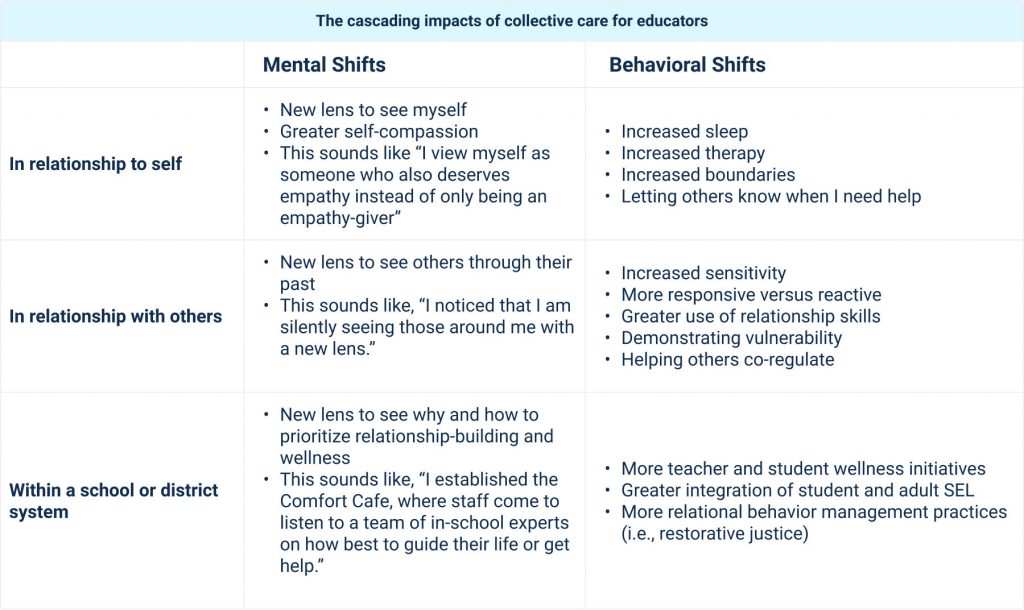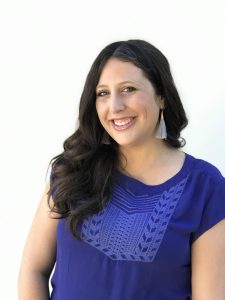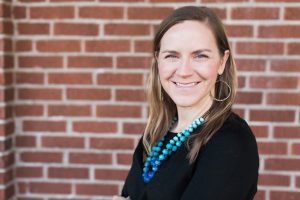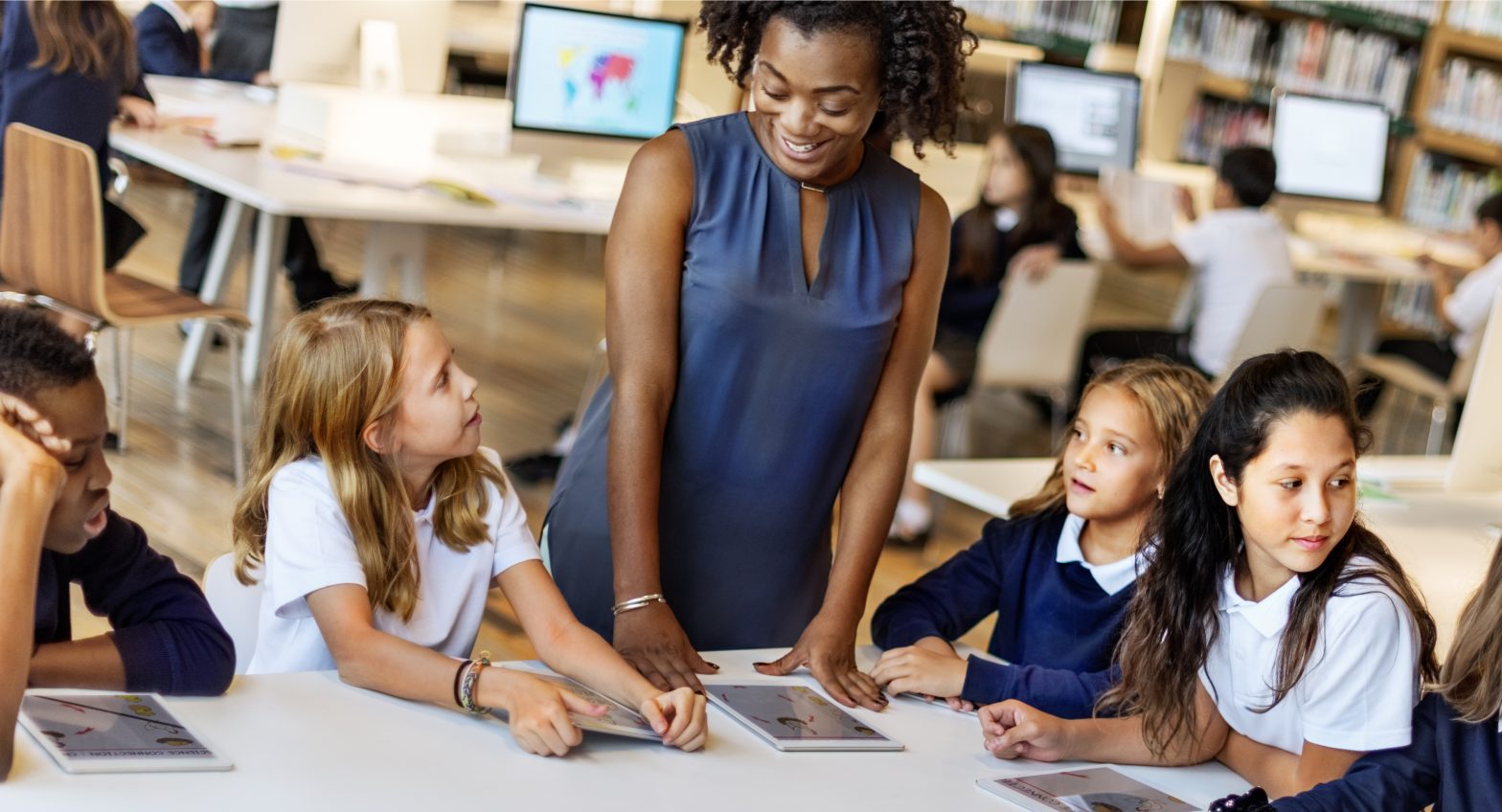After a year of teaching and living through a pandemic, educator mental health is at risk and yet, at the same time, we desperately need to avoid further school disruptions. Teacher burnout and turnover — already cause for concern long before pandemic life — have increased. An additional 11 percent of teachers say they may leave the classroom even though they weren’t planning to do so before. As it is, 40-50% of teachers leave the classroom within their first five years, and 40% of teachers in Houston’s three-county region have fewer than five years of experience, which affects student achievement.
Teachers are often told to put their own oxygen masks on first. They’re encouraged to “take care of themselves,” get more sleep, take deep breaths. Mindfulness training and toolkits have recently gained attention as promising school-based interventions to address the burnout cascade, but most mindfulness approaches reflect a primarily solitary practice aimed at individual growth. These strategies, while well-intended, can feel dismissive to teachers. It’s as if we are telling a sick person to just “get better.” Educators’ burnout symptoms are due to much larger, systemic and cultural problems.
Many teachers talk to us about the relational gaps they experience in schools: the stress of loneliness, isolation, and toxic adult cultures. Relationship problems cannot be solved by any individual’s actions alone. It requires comprehensive approaches that involve every adult.
FuelEd is a non-profit organization deeply devoted to educator social-emotional skills and wellbeing. But we rarely use the term “educator self-care” — because it’s kind of a misnomer. On a neurobiological level, what society traditionally thinks of as self-care simply isn’t possible without first receiving care in relationships. Over the course of our development as social creatures, humans go on a journey from being almost completely regulated by others, as is the case with a hungry, crying infant who needs the constant care of an adult; to being co-regulated, where we get help from another person as we attempt to regulate ourselves. Over time, through repeated experiences of being calmed and cared for through relationships, we humans develop the brain structures and skills for self-regulation, self-care, and resilience in the face of stress.
Care from others precedes self-care. So, solving the teacher stress crisis is less a matter of asking teachers to put on their own oxygen masks, but rather ensuring every teacher has someone who can help put an oxygen mask on with them.
Our vision? The whole educator
FuelEd is a professional learning organization that provides teachers, principals and district leaders with training in the science of relationships as well as support to grow their own social and emotional competencies. We assist educators in doing the “inner work” of exploring their triggers, attachment styles and early childhood experiences, while also learning the science of attachment and trauma, and key skills to build secure relationships.
This therapeutic deep dive into self-awareness is most poignantly represented by our “mindful storytelling” circle, where small groups of educators share their “attachment stories.” Educators take turns recounting memories from early childhood relationships, exploring the hurt caused by parents/caregivers who didn’t meet their needs, and unpacking how these formative experiences influence their relationships today, in school and out. You can hear a pin drop as educators take the risk to share, and listen, with sincere intent and deep respect for one anothers’ stories.
At the conclusion of the training, educators learn to build a peer-support network: a protocol we call “stewardship” where educators are paired and instructed to meet weekly for an hour. Week after week, one educator shows up ready to listen deeply, and the other shows up ready to share real problems from their professional or personal lives, with honesty and vulnerability. The relationship skills from the training provides the foundational building blocks needed to support, and receive support, from fellow educators. Educators’ newfound self-awareness serves as a starting point to go deeper into themselves. What results is a mutually beneficial giving-and-receiving of care. It’s a repeated and reliable experience of co-regulation: helping educators move from stress to calm with the support of a caring relationship.
One year later, our educators were asked, “Since engaging with FuelEd, have you experienced an increase in the following [self-care] behaviors?” Here is what we’ve found.
Educators’ self-care, self-regulation and resilience grew through relationships that took them deeper into self-awareness through being known, seen and loved. Reaching out helps us reach in. This is especially true in times of crisis and transition. Researcher Dr. Liesel Ebersohn believes “flocking”—huddling up and sticking together, like a flock of birds — might be a way of coping with stress that is more adaptive than the other more commonly known stress responses of flight, fight or freeze. This is exactly what educators in our studies have done: used relationships as self-care, as a way to regulate themselves.
“There’s no other time in my week where I have an hour to speak uninterrupted about something of emotional weight. It’s a pressure release valve. It’s good for my mental health and makes me more conscious in my relationships—particularly with my kids. This inspired me to go to therapy …. to move away from survival, to look at myself as a human being, not just a teacher. This helped me to take care of myself.” -Educator
Without an emphasis on restoring educator resilience through relationship, isolation and “flight” from the field may occur.
Caring for teachers is caring for students
Being cared for by others helps educators care for themselves, but being seen by others also helps educators change how they see themselves and their students. Our intervention grows educators’ theory of mind, an important social-cognitive skill that involves the ability to think about thoughts, emotions and beliefs — both your own and others — and to plan social responses based on the internal worlds of others. Theory of mind involves thinking about thinking, but it also refers to the ability to understand that other people’s thoughts and beliefs may be different from your own and to consider the factors that led to those mental states.
It appears that the experience of unpacking their own history and trauma may enable educators to develop compassion, sensitivity, and responsiveness to students and their trauma. When educators understand that their past shapes and influences who they are, they begin to understand that others’ pasts similarly shape who they are and how they show up. The research team at FuelEd developed the term “storysight” to describe this capacity to understand others through the lens of their own story.
“Reflecting on my own background and life …has helped me understand myself and be more empathetic with others. I’ve been nice with myself and gentler with myself. I feel like I have more of a handle on that [so now] I’ve been doing that with my own students. Giving them a break. Letting them mess up. Now, I feel like I react to what the child needs, not what I need. I have a greater rapport with the kids this year. You’re seeing more to a child than what you normally would see.”
When asked what, if any, changes educators experienced in the following areas, one year after their training, here is what we found.
These changes to teachers’ relationship behaviors are significant, as multitudes of studies have shown the ways strong teacher-student relationships promote higher academic achievement, greater social competence, and fewer behavioral problems in students. Clearly, taking care of teachers is taking care of students.
How to change a system?
Even more exciting is the way that investing in teachers’ wellbeing through collective care can create a ripple effect that shifts policies and practices within schools and district systems.
In 2015, Principal Sarah Guererro was charged by the superintendent of Spring Branch Independent School District to turn her school around, academically. After she and her leadership team at Northbrook Middle School attended a FuelEd training, they committed to setting up an essential practice that would create more time and space for listening to staff. They already had weekly teacher meetings for discussing student progress, but additional check-ins were set in motion to help leadership gain awareness of teachers’ feelings, needs and perspectives. Educators were invited to share whatever they wished — be it an issue with classroom management or personal issues at home. According to Brian Jaffe, the school’s Social Emotional Learning (SEL) Support Specialist, “Because I had that safe space to feel valued by my principal, I was able to provide that for my teachers, and the teachers were then able to create the same safety for students. We saw this ripple out to create an entire ecosystem of support.”
As Northbrook Middle School became a community where adults felt safe and valued, educators began to connect more with students and as a result, learned a lot more about them. Suddenly, there was an overabundance of information and awareness about the high levels of trauma and social-emotional needs within the student body. To solve this, the team created a referral system whereby those closest to the ground—teachers and students—could quickly and easily submit a student’s name to the school support team who then provided a similar “check in” for the student.
By being responsive and timely, and addressing concerns big and small, trust was built in this systematic practice that helped all students and staff feel safe and seen. Over the course of five years, the school witnessed significant improvements: 67% reduction of out of school placement, in which a student is located to an alternative schooling environment in order to meet their unique needs; staff retention went from 57% to 80-90%; and a 21% increase in student achievement on STAAR.
The Anatomy of Change
As this story demonstrates, teaching, learning and leading in schools is an interpersonal endeavor and therefore, traditional school achievement outcomes such as teacher retention and student achievement are deeply intertwined with personal and interpersonal dynamics on a school campus. The table below illuminates what FuelEd is discovering to be the anatomy of this complex and dynamic change process:

What can we do, now?
The truth is, our educational system’s current issues related to educator stress are not new. Teaching is a highly stressful profession and it’s not just because of large class sizes or pressures of state testing. The emotional lives of educators and associated burnout-related fatigue are affected by their vicarious exposure to students’ trauma. Add to this: like students, teachers and principals also have their own experiences with trauma, which shape their thoughts, feelings and behavior in relationships. Our bodies keep a record of experiences in our lives where safety was lost, so any unprocessed trauma can be triggered in the classroom, regardless of whether it happened 20 years or 20 days ago. And though these reactions can be driven by protective instincts, they can also exhaust educators emotionally and damage relationships in equal measure. Call it a job hazard for teachers whose careers are built on emotional regulation, and whose effectiveness is grounded in their ability to build healthy relationships.
The need is real and recognized by educators who tell us how much they value trauma-informed adult SEL and wellness work—but educators also express strong tensions about not having time or space to engage regularly. Creating and incentivizing feasible systems where educators both give and receive care, as a routine part of the profession, would represent an innovative approach to the problem of teacher stress and burnout.
Here are some ideas for how you can get started:
- Build a stewardship system in schools. Consider building a low-stress, low-cost peer support system at your school or district. The ROI is huge in terms of self-regulation and stress release. Capacity and skill building for staff in empathic communication is a critical prerequisite to ensure safety and effectiveness of the system, so be sure to secure necessary professional development.
- Provide counseling for educators. Counseling is an intensive relational experience of being safe, seen and soothed. FuelEd has provided over 12,000 counseling sessions to teachers since 2012. We have found that when school districts actively promote, normalize, and create pathways for attending therapy, many teachers engage, and experience powerful impacts on their well-being and careers.
- Expand the definition of trauma-informed to include educator trauma. Our childhoods shape who we are. Educators cannot address students’ social-emotional needs nor be “trauma-informed” if they have not processed their own trauma and social-emotional needs. Fortunately, secure relationships that help us reflect on our past heal trauma. If we can shift the definition of trauma-informed practice to include educator trauma, school climates can become places where students and adults alike can heal and thrive.
Educator care is not a flash in the pan. It’s not one-time professional development, it’s not a worksheet, it’s not a daily meditation nor a sudsy soak in the tub. Building individuals means building communities, and vice versa. And so, the very best thing we can do for our children, and the adults who serve them, is to make schools into places where secure relationships and adult development happen every day in the regular course of work. Places where educators are accepted for who they are and encouraged for who they can become. So they can do the very same thing for our children.
About the Authors

Megan Marcus is the Founder of FuelEd. She holds a B.A. in Psychology from the University of California at Berkeley, a Masters degree in Psychology from Pepperdine University, and a Masters in Education, Policy, and Management from Harvard’s Graduate School of Education. In 2017, Megan was named an Ashoka Fellow, “a leading social entrepreneur [recognized] to have innovative solutions to social problems and the potential to change patterns across society.

Dr. Kelley Munger is the Director of Research & Development at FuelEd. She holds a BA in English from Auburn University, an MA in Teaching from Lee University, and an MA in Counseling Psychology from Covenant Seminary. She completed her PhD in Early Intervention and Special Education at the University of Oregon in 2019. Kelley is a researcher and licensed therapist working in the areas of trauma, adult attachment, special education, and human development.
